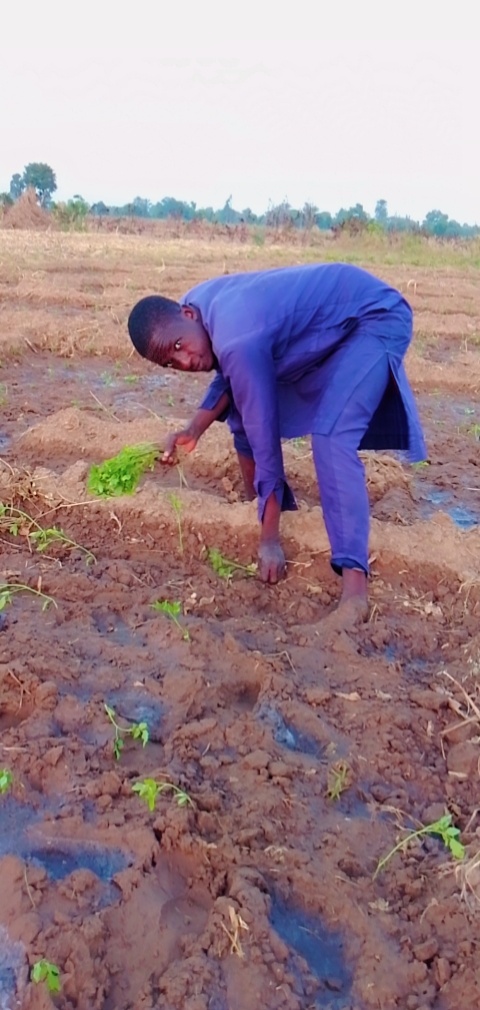Many Nigerians are still feeling the negative impact of fuel subsidy removal despite assurances by the federal government that the decision was made for the good of the country.
Dry season farmers who use fuel-powered water pumps to irrigate their farmlands are among poor Nigerians who bear the brunt of the fuel subsidy removal.
Although Nigeria’s agriculture is predominantly rainfed, a lot of farmers are now harnessing the potential of dry season farming to ensure all year-round income and contribute to the increase in the domestic food production.
However, with the removal fuel subsidy, some dry season farmers decried that the situation had affected their production as they have to buy fuel at exorbitant price to power the water pump and wet their farmlands.
- How 28-yr-old uses innovative approach to save his fish farm
- FG summons manufacturers over rising cost of cement
Adamu Salisu Dalibi is one of the dry season farmers in Sabuwar Gwaram community in Gwaram Local Government Area of Jigawa State who has been forced out of production. He said he could no longer afford fuel at its current price to irrigate his farm on a weekly basis.
“Last year we suffered losses due to naira redesign policy by the federal government. This year again, we were faced with the challenge of hike in the price of fuel occasioned by the subsidy removal on the product. When we planted our crops last year in late November, we thought the fuel crisis would end by January this year, but it persisted,” Dalibi recounted.
He added that after irrigating the crops for about a month, he realised he could not continue to maintain the frequency of the irrigation.
“When I couldn’t continue to irrigate the crops on a weekly basis as I used to, the farm started drying up just at a stage when the tomato was flowering and the habanero pepper had started fruiting. So, I sold the crops to someone who could afford the expenses.”
Another farmer, Mubarak Auwal, with over a decade of experience in farming, shared a similar experience.
“Things are hard. I can’t afford to expend N10,000 weekly to buy fuel to irrigate my farm. Before the fuel subsidy removal, I was spending barely N4,000 on fuel. When I noticed the crops were drying and shriveling up due to moisture stress, I resolved to sell them to someone who would continue the production because the plants were young at that stage and couldn’t be offered to market for sale. But I’m telling you part of the farmland had already gone before I could sell the remaining crops,” he said.
Sani Mu’azu is a dry season farmer in Shika village, Giwa Local Government Area of Kaduna State. Narrating the plight of farmers, he said in addition to the increase in price of fuel, they also grappled with the challenge of ground water depletion and skyrocketing price of inputs such as fertilizer.
He said, “For us here, it is not only the problem of fuel. The ground water is also declining and this means more fuel and time to get the crops fully wet. But with the exorbitant price of fuel, we can’t afford that, and so we only irrigate not to the satisfaction of the crops but to what our pockets can afford, and you know this will definitely have negative impact on the yield.”
Kabiru Abdullahi, a dry season farmer in Zaria, has a similar tale to tell.
“One of the major challenges we have is the price of fuel and, of course, groundwater decline. The water is drying up and this amounts to additional cost as you have to increase the fuel you are buying before, just so you can have the water to go round the farm,” he stated.
Asked how the groundwater depletion affected his production, Mu’azu said, “I had to sell my onions at a very young age, a month earlier than I would sell them if things were fine. The issue is, as the water depletes, it means you have to irrigate for more hours than you would if the groundwater is readily adequate, and the implication is that you will need more fuel to pump the water using the pumping machine. On fuel alone, I spend between N10,000 and N15,000 in a week.”
Unlike Sani Salisu Ahmad of Kura Local Government Area of Kano State who takes advantage of Tiga dam irrigation channels for his dry season farming, Nasiru Ashaduma said the current cost of fuel is biting harder and making it difficult for him to adequately manage his farm.
Ashaduma is a family man who uses the proceeds of his farm to provide for his wife and five kids. In the wake of soaring prices of food items and other commodities, he said he had to sell his crops before the normal harvest period to cater to his family and buy fuel for irrigating the remaining crops on the farm.
“Sometimes we will run out of fuel at the middle of work, and we have to harvest some of the crops and sell to be able to have the money to buy fuel to continue with the irrigation,” he lamented.

 Join Daily Trust WhatsApp Community For Quick Access To News and Happenings Around You.
Join Daily Trust WhatsApp Community For Quick Access To News and Happenings Around You.

